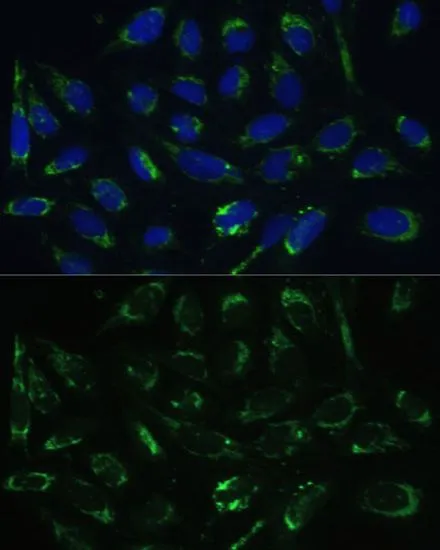
ICC/IF analysis of U2OS cells using GTX33249 ERAB antibody. Blue : DAPI Dilution : 1:100
ERAB antibody
GTX33249
ApplicationsImmunoFluorescence, Western Blot, ImmunoCytoChemistry, ImmunoHistoChemistry, ImmunoHistoChemistry Paraffin
Product group Antibodies
ReactivityHuman, Mouse, Rat
TargetHSD17B10
Overview
- SupplierGeneTex
- Product NameERAB antibody
- Delivery Days Customer9
- Application Supplier NoteWB: 1:500 - 1:2000. ICC/IF: 1:50 - 1:100. IHC-P: 1:50 - 1:100. *Optimal dilutions/concentrations should be determined by the researcher.Not tested in other applications.
- ApplicationsImmunoFluorescence, Western Blot, ImmunoCytoChemistry, ImmunoHistoChemistry, ImmunoHistoChemistry Paraffin
- CertificationResearch Use Only
- ClonalityPolyclonal
- ConjugateUnconjugated
- Gene ID3028
- Target nameHSD17B10
- Target descriptionhydroxysteroid 17-beta dehydrogenase 10
- Target synonyms17b-HSD10, ABAD, CAMR, DUPXp11.22, ERAB, HADH2, HCD2, HSD10MD, MHBD, MRPP2, MRX17, MRX31, MRXS10, SCHAD, SDR5C1, 3-hydroxyacyl-CoA dehydrogenase type-2, 3-hydroxy-2-methylbutyryl-CoA dehydrogenase, AB-binding alcohol dehydrogenase, amyloid-beta peptide binding alcohol dehydrogenase, endoplasmic reticulum-associated amyloid beta-peptide-binding protein, mitochondrial RNase P subunit 2, mitochondrial ribonuclease P protein 2, short chain L-3-hydroxyacyl-CoA dehydrogenase type 2, short chain type dehydrogenase/reductase XH98G2
- HostRabbit
- IsotypeIgG
- Protein IDQ99714
- Protein Name3-hydroxyacyl-CoA dehydrogenase type-2
- Scientific DescriptionThis gene encodes 3-hydroxyacyl-CoA dehydrogenase type II, a member of the short-chain dehydrogenase/reductase superfamily. The gene product is a mitochondrial protein that catalyzes the oxidation of a wide variety of fatty acids and steroids, and is a subunit of mitochondrial ribonuclease P, which is involved in tRNA maturation. The protein has been implicated in the development of Alzheimer disease, and mutations in the gene are the cause of 17beta-hydroxysteroid dehydrogenase type 10 (HSD10) deficiency. Several alternatively spliced transcript variants have been identified, but the full-length nature of only two transcript variants has been determined. [provided by RefSeq, Aug 2014]
- ReactivityHuman, Mouse, Rat
- Storage Instruction-20°C or -80°C,2°C to 8°C
- UNSPSC12352203

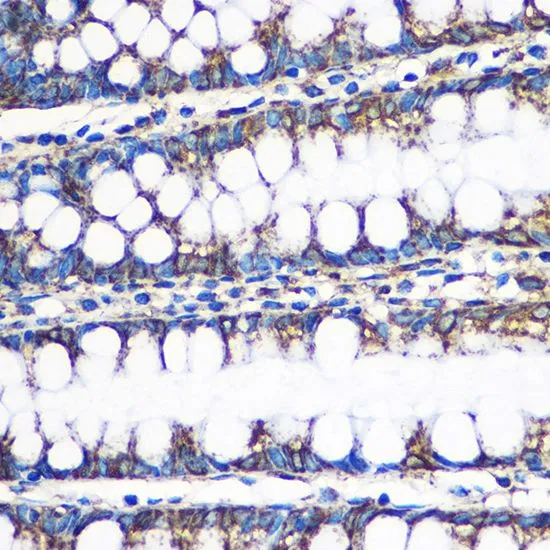
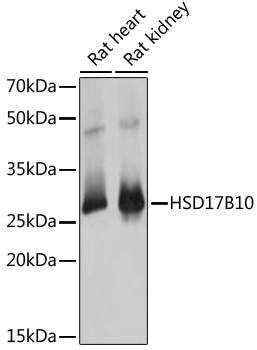
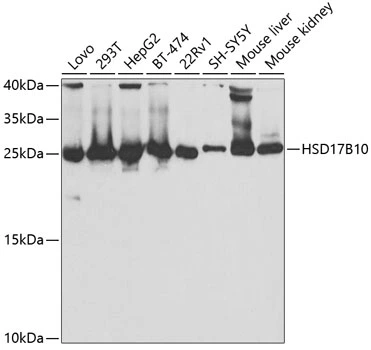
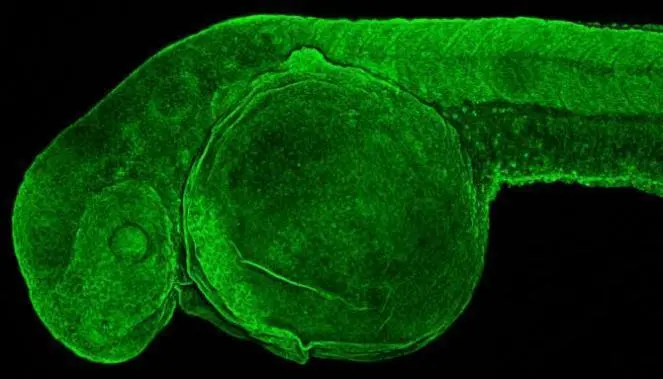
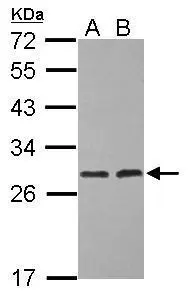
![ERAB antibody [N2C3] detects ERAB protein at cytoplasm on human colon carcinoma by immunohistochemical analysis. Sample: Paraffin-embedded colon carcinoma. ERAB antibody [N2C3] (GTX113455) dilution: 1:250. Antigen Retrieval: Trilogy? (EDTA based, pH 8.0) buffer, 15min](https://www.genetex.com/upload/website/prouct_img/normal/GTX113455/GTX113455_40135_IHC_w_23051501_162.webp)
![ICC/IF analysis of COS7 cells transiently transfected with ERAB plasmid using GTX84344 ERAB antibody [5E2].](https://www.genetex.com/upload/website/prouct_img/normal/GTX84344/GTX84344_1047_ICCIF_w_23061420_229.webp)
![FACS analysis of HeLa cells using GTX84346 ERAB antibody [10B4]. Red : Primary antibody Blue : Negative control antibody](https://www.genetex.com/upload/website/prouct_img/normal/GTX84346/GTX84346_371_FACS_w_23061420_499.webp)
![IHC-P analysis of human pancreas tissue using GTX84347 ERAB antibody [11A2]. Antigen retrieval : Heat-induced epitope retrieval by 10mM citrate buffer, pH6.0, 100oC for 10min.](https://www.genetex.com/upload/website/prouct_img/normal/GTX84347/GTX84347_2645_IHC-P_w_23061420_589.webp)
